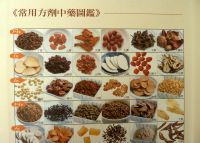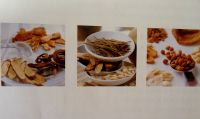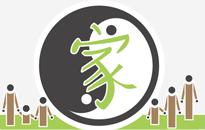Family doctors for parents & children
HOLISTIC
FAMILY
MEDICINE
Chinese Herbal Medicine
In China, treatment with herbal teas is the most frequently used method of Chinese medicine especially in the treatment of internal diseases. Very often, e.g. during an acute illness, the “decotion” (tea cooked from herbs) alone is enough as a quick and effective treatment. Even acupuncture and moxibustion (zhenjiu) are often combined with a herbal tea prescription according to the Chinese diagnosis. Of the five treatment modules of TCM, herbal medicine is certainly most widely applied. In our practice, Chinese herbal teas are prescribed for acute infections as well as for chronic diseases of the respiratory tract, infections of the urinary tract and genital organs, women's ailments and chronif deficiency states.
The majority of remedies used are parts of plants. Less often, minerals and animal substances. Each  remedy is characterized by its properties regarding temperature (cold, warm or neutral), taste (spicy, sweet, neutral, sour, bitter, salty), its association to which organ or function area and its effects. Based on the diagnosis according to TCM and the corresponding treatment concept, the necessary and suitable remedies are selected and put together in a formula which also takes into consideration the relationship and interaction of the individual remedies with each other.
remedy is characterized by its properties regarding temperature (cold, warm or neutral), taste (spicy, sweet, neutral, sour, bitter, salty), its association to which organ or function area and its effects. Based on the diagnosis according to TCM and the corresponding treatment concept, the necessary and suitable remedies are selected and put together in a formula which also takes into consideration the relationship and interaction of the individual remedies with each other.
 Traditionally, the dried herbs and remedies are cooked in water according to instructions and the resulting tea (“decotion”) is divided into portions to be taken in over the day. In western countries nowadays, a convenient way of application using the drugs in powder form (“granulates”) has become very popular. The individual drugs are processed through dry-freezing technique into power form. The mixture of these based on the formula is used by stirring and dissolving the prescribed amount into hot water. Experience confirms, that this method has a good effect besides the obvious advantage of being more convenient. A third possibility of dispensing is in the form of drops (“hydrophilic conentrates”) which is especially valuable and highly recommendable for children. These do not contain alcohol and the taste is neutral and readily acceptable by youngsters.
Traditionally, the dried herbs and remedies are cooked in water according to instructions and the resulting tea (“decotion”) is divided into portions to be taken in over the day. In western countries nowadays, a convenient way of application using the drugs in powder form (“granulates”) has become very popular. The individual drugs are processed through dry-freezing technique into power form. The mixture of these based on the formula is used by stirring and dissolving the prescribed amount into hot water. Experience confirms, that this method has a good effect besides the obvious advantage of being more convenient. A third possibility of dispensing is in the form of drops (“hydrophilic conentrates”) which is especially valuable and highly recommendable for children. These do not contain alcohol and the taste is neutral and readily acceptable by youngsters.
We have experience over the years using all three forms of dispensing through the co-operation with local and other pharmacies and pharmaceutical companies which also check the qualities of the drugs they supply according to the requirements of standards in Germany.


